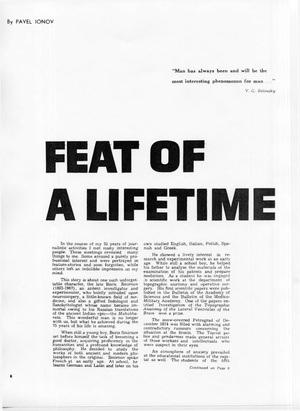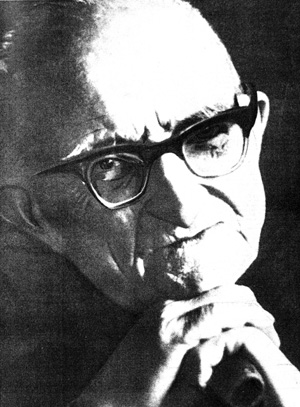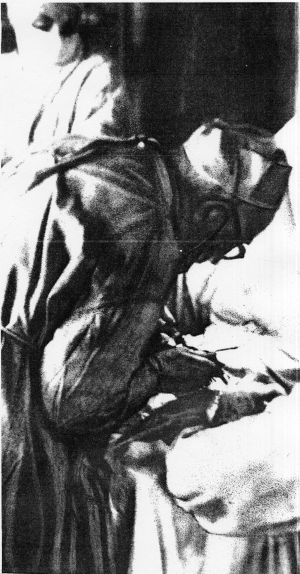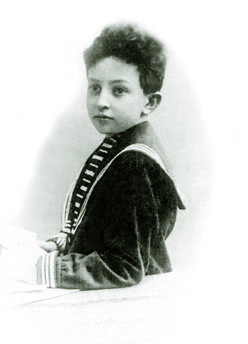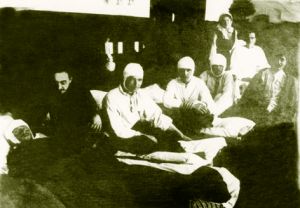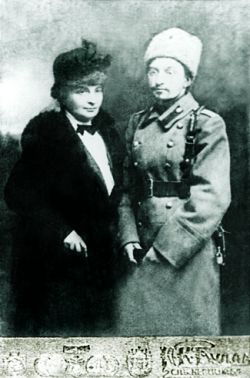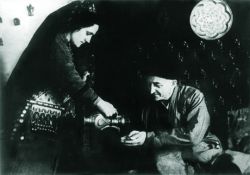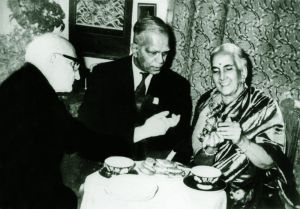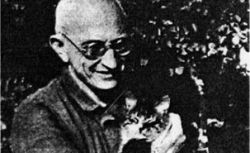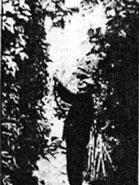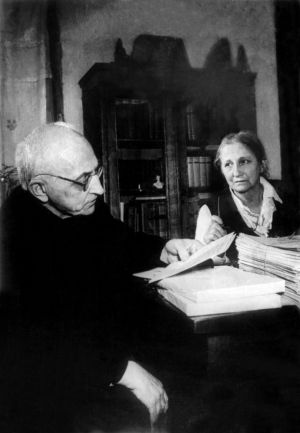Feat of a lifetime / Ionov P. - 1968
Ionov Pavel
Скачать: Feat of a lifetime (Ionov P. - 1968).pdf
"Man has always been and will be the
most interesting phenomenon for man ..."
V. G. Belinsky
In the course of my 25 years of journalistic activities I met many interesting people. These meetings revealed many things to me. Some aroused a purely professional interest and were portrayed in feature-stories and soon forgotten, while others left an indelible impression on my mind.
This story is about one such unforgettable character, the late Boris Smirnov (1891-1967)[1], an ardent investigator and experimenter, who boldly intruded upon neurosurgery, a little-known field of medicine, and also a gifted Indologist and Sanskritologist whose name became immortal owing to his Russian translations of the ancient Indian epic — the Mahabharata. This wonderful man is no longer with us, but what he achieved during the 75 years of his life is amazing.
When still a young boy, Boris Smirnov set before himself the task of becoming a good doctor, acquiring proficiency in the humanities and a profound knowledge of philosophy. He decided to study the works of both ancient and modern philosophers in the original. Smirnov spoke French at an early age. At school, he learnt German and Latin and later on his own studied English, Italian, Polish, Spanish and Greek.
He showed a lively interest in research and experimental work at an early age. While still a school boy, he helped his father to analyse the materials of the examination of his patents and prepare medicines. As a student he was engaged "n scientific work at the department of topographic anatomy and operative surgery. His first scientific papers were published in the Bulletin of the Academy of Sciences and the Bulletin of the Medico-Military Academy. One of the papers entitled Investigation of the Topographic Anatomy of the Lateral Ventricles of the Brain won a prize.
The snow-covered Petrograd of December 1914 was filled with alarming and contradictory rumours concerning the situation at the fronts. The Tsarist police and gendarmes made general arrests of those workers and intellectuals who were suspect in their eyes.
An atmosphere of anxiety prevailed at the educational institutions of the capital as well. The students of the fifth course of the Medico-Military Academy were given leave six months before time. The graduates were immediately sent to the front.
Boris Smirnov, a former student, had to face all the horrors and misfortunes of war. But in spite of the trying conditions, the young man found strength to continue his scientific work. He gathered and later systematised and analysed abundant material on craniocerebral traumas
The young doctor became a witness of numerous cases of desertion and refusal to obey the orders of the commanders on the part of the soldiers and of the severe punishments pronounced by the court martials. The youth was haunted by doubts: who needed this war that destroyed thousands of human lives? How could one go on respecting the governments that drove the youth, the hope of their states to self-destruction? Wasn't it better, as the Bolsheviks urged, to stop the absurd shedding of blood, declare peace and establish the sovereignty of the people in Russia?...
However, the young doctor was yet to find an answer to these problems, that continuously vexed him, and. consequently, to decide whose part to take at this crucial moment of Russia's life He did not arrive at the decision at once.
The war, as the Bolsheviks had predicted, resulted in the creation of a revolutionary situation in Russia. The Tsarist autocracy was overthrown The Provisional Government that advocated war "to the victorious end" did not stay in power long. The Great October Socialist Revolution gained victory. The people became masters of their own destiny
ENCOUNTER WITH THE MAHABHARATA
In March 1918, 26-year-old Boris Smirnov was passing through Kiev on his way to his native village of Kozlenichi Waiting for the train (there was no regular Time-table at that time) he actually stayed at the railway station sleeping under a table Sometimes he would leave his place for a short while to stroll about the war-scorched city.
During one of his walks Smirnov came across a secondhand bookshop. Rum-maging among the books he found a grammar of the Sanskrit language written by Knauer. Professor of the Kiev University. He bougnt it very cheap. Thus, by sheer accident the young man became interested in the study of the ancient Indian language Of course, he little knew at the time that the purchase of the old grammar-book would mean a turning point in his life
The establishment of Soviet power was announced in the Ukraine, but the situation here was extremely serious. The democratically-minded youth was no longer in doubt as to whose side to take. He had long, made his choice to be with the people. Boris Smirnov worked as a doctor in his native village, at the Military Commissariat in Sosnitsa, the main town of the district, at the military sanitary station at the railway station of Mena, and at other places.
"I devoted to the study of the Sanskrit, language not more than 30 minutes a day as I was extremely busy," Boris Smirnov wrote in his recollections. "But still by the winter of 1918-1919, I was already able to begin interpreting the text of Savitri-Satyavan Upakhyan from the third volume of the Mahabharata."
The first timid attempts of the new Sanskritologist were in the nature of a hobby. Smirnov was chiefly occupied with broadening his medical knowledge. He systematised and analysed the abundant, material gathered by him during the war on craniocerebral traumas and begining with 1922 was engaged in scientific and pedagogical work at the department of nervous diseases of the First Kiev Medical Institute. Five years later, he defended his thesis for the title of an assistant professor.
Nevertheless, the study of the Sanskrit language did not lose its attraction for the young scientist. He succeeded in finding and buying for himself a copy of the Bhagavadgita printed in the Devanagari script, and a number of dictionaries.
Boris Smirnov carefully studied all the monographs and magazine articles published in Russian and foreign languages on the Bhagavadgita that he could find in the biggest libraries of the country.
MEDICINE ALONG WITH THE MAHABHARATA
Which scientist who has devoted all his life to the study of the cultural heritage of a certain country does not dream of visiting it some day? Boris Smirnov, too, cherished a hope in his heart of seeing India with his own eyes, and in the meantime to be closer to it, moved in 1935 to Turkmenia, to the south border of the Soviet Union. Regarding this proximity, from a historical point of view, one can see an age-old geographical and cultural community of the Indian and the Turkmenian peoples At present, it is a well-known fact, The archaeological excavations on the site of the ancient city of Merva that had existed for more than 2,500 years enabled the scientists to make the following staggering discovery: Buddnisrn was professed here long before Islam! The unearthed temple with the giant clay statue of the Buddha testifies to the fact, it is also confirmed by the existence of the Turkman Gate in old Delhi and by Bairam-Khan, an outstanding Turkmenian poet, general and statesman of the XVI century, who spent all his life in India, was a relative and protege of Zahiruddin Muhammed Babur, founder of the dynasty of the Great Moguls.
In Turkmenia, Boris Smirnov already realised that the Mahabharata was no longer a mere hobby for him, but a necessary and desired occupation to which he was ready to devote his life.
However, his first occupation—medicine—still engaged him. Boris Smirnov worked as a researcher at the Turkmenian scientific Research Institute of Neurology and Physiotherapy, as a neurosurgeon-consultant and head of a hospital for nervous diseases.
The war of 1941-1945 required of Dr. Boris Smirnov all his medical knowledge and skill. He spent almost every day in operation rooms at evacuation hospitals and at the Hospital of Restorative Surgery. Boris Smirnov was the first in the Soviet Union to apply operative treatment of Schmorl's hernia, a protraction of the intervertebral disc into the cerebrospinal canal which caused the compression of the spinal cord and its roots, turning the patients into serious invalids.
"During this period I often travelled by plane to give consulations and perform neurosurgical operations," recalled Smirnov. "I often studied Sanskrit to while away the time in the plane."
Terrible were the days of the earthquake in Ashkhabad in October 1948. The city was literally razed to the ground. The victims numbered tens of thousands. When 56-year-old Professor Smirnov was pulled out from under the ruins of a collapsed house, he immediately hurried to the operation tent to help the suffering people, regardless of his age and heart, disease. The inhabitants of Ashkhabad will never forget his "heart of gold" and "magic hands".
RICHER KNOWLEDGE AND EXPERIENCE
The field of his medical activities was vast and versatile: neurosurgery and neurology, marginal pathology and physiotherapy, pathologic anatomy and science dealing with health resorts . . He wrote about 70 scientific works on these subjects.
One had to possess a great capacity for work, brilliant memory and a highly developed aptitude for synthesis in order to keep abreast of all the latest theoretical and practical achievements of Soviet and foreign medicine; frequently to go out to the remotest parts of the Republic to render specialised medical aid; to spend many hours at a stretch at the operation table performing the most labour-consuming and delicate operations — putting in stitches, removing tumours from the brain and spinal cord, making osteoplasty on the cranium. And, besides all these, he had to snatch away minutes from sleep and rest so as to let his mind wander back to the past ages, to the wonderful world of the Mahabharata...
With enviable generosity of heart Professor Smirnov devoted his academic knowledge and practical experience of many years to the future of Soviet medicine — young doctors and students.
A great erudition, devotion to his cause, confidence in people and a great love for them won Boris Smirnov the sincere respect not only of his colleagues, but also of the general public. He was appointed Chief Neuropathologist of the Republic, was a member of the scientific councils of the Ministry of Health Protection and of the Medical Institute, a member of the Society for the Dissemination of Political and Scientific Knowledge and Chairman of the Society of Neuropathologists and Psychiatrists.
Years passed . . Smirnov was having more and more trouble with his heart. Formerly the attacks used to last for a day or two, now they continued for weeks together. The professor had to postpone visiting his patients indefinitely... But his active brain could not remain idle. He remembered the words of Leonardo da Vinci: "Iron becomes covered with rust when it is not used, stagnant water either decomposes or freezes in cold weather, while the human mind deteriorates, when it has nothing to do." And again Boris Smirnov turned to the inexhaustible treasures of the Mahabharata.
I cannot remember a single meeting with Boris Smirnov when he, speaking with passion of the work of his life, would not exclaim: "How time flies! I wish I could manage to do what I have conceived..." And he worked hard.
But one cannot fight against the remorseless march of time, Smirnov spent much of his valuable time visiting patients, holding consultations and carrying on a very wide correspondence. One could not help wondering how he managed to answer hundreds of letters that he received from his friends, acquaintances and unknown correspondents: scientists, doctors and Indologists; patients asking for help, scholars of oriental philosophy, philology and literature; people who simply needed his advice and who felt that he would not refuse them. The letters came from every nook and corner of the country.
I have before me a sheet of paper. The title reads: "Prelude to the Bhagavadgita's Chapter entitled The Despair of Arjuna. To dear Boris Smirnov on his 75th birthday from Anatoli."
How and why did this sheet of paper appear on Smirnov's desk?
One day a letter addressed to Professor Smirnov arrived from Krivoi-Rog in the Ukraine. A young woman, Galina Ischenko by name, begged the professor to help save her husband who suffered from hemophilia (bleeding caused by poor blood coagulation). She wrote that they had both lost their parents at an early age and had been brought up in a children's home. They worked at a music school The husband conducted an orchestra of folk instruments and the wife was a pianist.
Boris Smirnov wrote many letters from Ashkhabad to Krivoi-Rog with instructions and recommendations concerning the treatment of the disease. After many years Anatoli Ischenko came to Ashkhabad to thank Professor Smirnov in person for the kind interest he had taken in him.
LIFE PROMPTS THE CORRECT CHOICE
We sat talking in the simply-furnished but very comfortable room. There were an old writing desk, a bookcase, two arm-chairs and a sofa-bed. But what attracted one's notce immediately on entering the room were the bronze and clay figurines and several pictures depicting oriental themes. But they testified more to the owner's hobby than to his profession.
Boris Smirnov was rather a lean sort of man of medium height. He wore a jacket and slippers. He was seriously ill: after a repeated myocardial infarction he had become a complete physical invalid. He had hardly left his house during the last ten years of his life. Very seldom he took even a short walk in the garden.
The first impression I got of this man of being completely isolated from the world and its affairs, immediately faded away, as soon as I heard his voice and looked into his eyes. The professor spoke with passion, the way a person usually speaks of the things he cherishes most dearly in life. His narrow wrinkled face with its broad massive forehead became transformed. From beneath his grey bushy eyebrows there looked upon you the tired, but burning eyes of a profound thinker.
By that time Boris Smirnov had already finished translating three independent poems from the Mahabharata: the famous Bhagavadgita, Savitri-Satyavan Upakhyan, and Nala-Damayanti Katha. During the last ten years, a number of pieces from the great epic including Rama-katha, Sanat-Sujata, Anugita Mahaprasthan, Swargarohan and Mokshadharma have been published in Russian.
Boris Smirnov accomplished a gigantic task. He had made beautiful translations of more than 22,000 couplets of the epic. Each volume is furnished with an introduction, commentary, explanatory notes and bibliographical index. The author also wrote five articles on the Mahabharata and four on Indian philosophy, both for the Philosophic Encyclopaedia.
Looking at it superficially one might think that the translation came very easy to Boris Smirnov. But that is not so. It was a laborious, painstaking work. The author did the translation of the Bhagavadgita, for instance, more than 20 times, for he was the first translator of the epic who had set before himself the complicated task of not only reproducing its content and rhythm, but also the inner melody of the Sanskrit couplets.
"I solved the main problem of finding the correct style and principles of translation when I was translating the Gita," Boris Smirnov told me. "Gita means Song," he continued, "therefore, I had to decide in the first instance which of the forms of the Russian poetics were closer in style to the Gita. For that purpose I had to study the Russian poetics and determine the forms and laws of Indian prosody."
This work produced fruitful results. It turned out that the Sanskrit couplets were closer in sound to the verse of the Russian folk-legend and to Pushkin's tales.
MAIN THING IS TO HAVE TIME
The professor spoke about his work in plain words stressing very logically complete thought with a gesture of his right hand. He said that he worked mostly lying on his sofa with a card-board reading-stand on his knees. Upon this stand he kept the Sanskrit text and a note-book with the literal translation.
In order to buck up his fading physical strength, Boris Smirnov got up every morning at five or six o'clock. After doing his exercises, he rubbed himself down with a sponge. The procedure was difficult for him, but it was necessary to enable him to complete the literal translation of the tenth volume of the Mahabharata. When his relatives told Smirnov that he was overstraining himself, he replied: "Not in the least. The exercises help me to feel fit. This should be done by everyone, even by sick people..."
The time which Lyudmila Erastovna, the professor's wife, had allowed me for the conversation was coming to a close. Smirnov, not knowing of the arrangement, was a little disappointed but added tactfully: "Young people are always hurrying somewhere..." He was obviously tired and kept quiet for a while. In the silence of the room the rhythmical ticking of the clock reminded us "that time never stood still.
"I set before myself the task of translating the most important part of the Mahabharata in the first instance. Therefore, I undertook to translate the philosophic part and not the epic one," said Smirnov.
When I sought his opinion about his work of so many years, he pretended not to have heard me. . .
In June 1965, I addressed Boris Smirnov on behalf of the Novosti Press Agency (APN), asking him to write a few words about his translations of the Mahabharata for the Indian press. Thanking me for the honour, he handed me the following letter meant, for the Indian readers:
"There is no law higher than truth."
"These words from the Mokshadharma can be used as an epigraph to the whole of the Mahabharata. the wonderful creation of the genius of the Indian people brightened up by the inner light of spiritual truth. The wealth of the Indian epic is as variegated as the facets of a diamond and quite inexhaustible. It happens sometimes that while reading one does not notice it, but then, suddenly, the secret meaning of one single couplet reaches the mind and everything is illuminated by the unfading light of truth, which appears in all its splendour like the radiant Shri appearing before Indra on the golden banks of the sacred gates of the Ganges (the Mokshadharma), for what is ethically truth is aesthetically beauty.
"I have devoted my work on the Gita of 25 years to the brotherhood of the Soviet and Indian people, while my work on the Mokshadharma and other books of the Mahabharata — to my great motherland constantly struggling for peace for all mankind.
"Be your thoughts happy and successful.
B. Smirnov."
The same October in spite of his not feeling quite well Boris Smirnov for the first time during his nine years' confinement left his house to attend a meeting with a delegation of members of the legislative assemblies of the Indian States headed by Shri Satya Narayan Sinha, the then Minister of Parliamentary Affairs and Communications of the Government of India.
A month later, Smirnov wrote on request of the APN an article for the Indian press entitled: "My Encounter with the Mahabharata.
In the second half of 1966 Smirnov wrote a scientific paper on "The Cultural Value of the Mahabharata".
In November 1966, he received at his house Shri K. P. S. Menon, Chairman of the National Council of the ISCUS and his wife Smt. Menon.
The Indian Embassy in Moscow sent Boris Smirnov an invitation to visit India The old scientist was deeply touched. Forgetting about his illness he started consulting his wife and near ones about the best way of accepting the invitation. India was quite close to his heart but he could not go by plane because of his poor health and there was no railway communication with Delhi. At last, it was decided to go by car. But, at that time the treacherous disease made itself known again...
DUET OF EPOCHS
Not only outstanding people have had the happy chance of experiencing during their lives the creative satisfaction of their bold scientific conclusions, hypotheses and forecasts being confirmed by life itself. Professor Smirnov had the opportunity of making sure that he had chosen the right path in his work of many years devoted to the mastering of the Sanskrit language and to the perfecting of his translations.
It was one of the usual days when the professor kindly consented to receive me But from the very first moments the interview acquired an unusual, and even, I should say, mysterious character. My host invited me to listen to the recording of an extract from the Mahabharata read in Sanskrit by Prof. Nirmal Chandra Maitra to the accompaniment of Indian musical instruments.
The enchanting melody of the rhymes, very much like that of the ancient Russian folk-legends, filled the air. And suddenly the soft voice of Professor Smirnov reading the same lines in his Russian translation flowed into the melody and began to sound in unison. This voice, excited and a little solemn, became stronger and stronger It was an unheard-of duet that struck the imagination, a duet of epochs divided by thousands of years!...
The recital was over. For a long time we were almost mute with wonder—impressed by something great having taken place.
"I am happy, that my principle of translation proved to be correct," said the professor at last, having controlled his emotion. "As you have just had the opportunity of bearing, the melodiousness of the rhymes in the Russian translation is synchronous with the Sanskrit original."
Thus, was this brilliant victory gained. To study and analyse it and make it the property of all mankind, to give its creator his due and to continue further the feat of his lifetime — is the noble task of the Orientalists and Indologists of the present day and of the future.
Notes
- ↑ Corrected. The article incorrectly stated the year of birth (1892-1967). Note from the BoLeSmir editorial Board.
